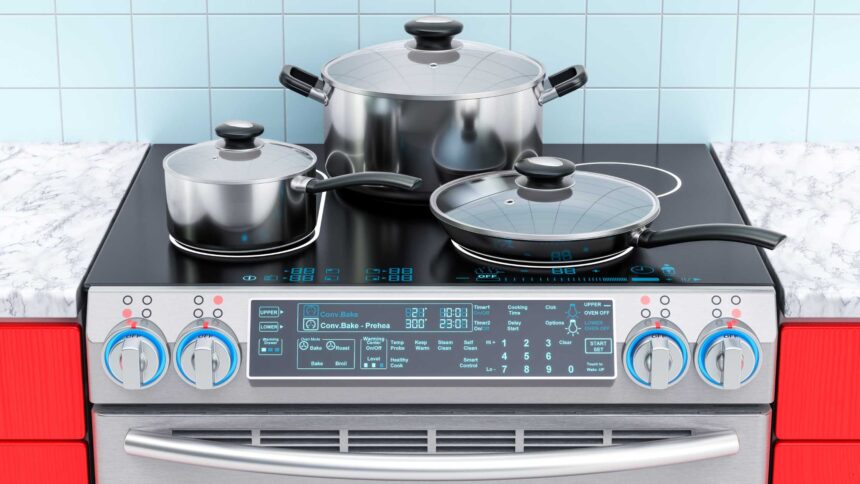What is an Induction Stove?
Induction stoves are revolutionizing the way we cook. Not at all like conventional gas or electric stoves, they utilize electromagnetic fields to directly heat cookware, offering a faster, more accurate, and energy-efficient cooking experience. This in-depth guide dives into the world of induction stoves, exploring their functionality, benefits, and everything you need to know to elevate your kitchen game.
How Does It Work?

The magic behind induction cooking lies in electromagnetism. Under the smooth, glass-ceramic surface of an induction cooktop sits a copper coil. When the stove is turned on, an alternating current passes through the coil, generating a rapidly changing magnetic field. This field will not directly heat the cooktop itself. Instead, it interacts with any compatible cookware placed on the surface.
When a ferrous (magnetic) pot or pan comes into contact with the cooktop, the changing magnetic field induces eddy currents within the pan’s base. This electrical resistance creates heat directly in the cookware, effectively transforming your pan into its own heating element.
Types of Induction Stoves
Induction stoves come in various configurations to suit different kitchen layouts and needs:
- Portable Induction Cooktops: Compact and versatile, these are ideal for small kitchens, dorms, or RVs.
- Built-in Induction Cooktops: Seamlessly integrated into your countertop, offering a sleek and modern look.
- Induction Ranges: Combine an induction cooktop with a built-in oven, providing a complete cooking solution.
Advantages and Disadvantages of Induction Stoves

Advantages:
- Faster Cooking: Induction cooktops transfer heat directly, leading to significantly faster boiling and heating times.
- Precise Temperature Control: Fine-tuned temperature adjustments allow for meticulous cooking, perfect for delicate dishes.
- Energy Efficiency: Less heat is wasted compared to gas or traditional electric stoves, resulting in lower energy bills.
- Safety: The cooktop surface stays remains moderately cool during operation, minimizing the risk of burns.
- Easy Cleaning: Messes don’t burn on the cooktop, making cleanup a gentle airflow
Disadvantages:
- Cost: Induction cooktops tend to be more costly than conventional alternatives.
- Cookware Compatibility: Only cookware made with magnetic materials (cast iron, stainless steel with a magnetic base) works on induction stoves.
- Noise: Some induction cooktops might generate a humming sound during operation.
Importance of Induction Stoves
Induction stoves offer more advantages over traditional cooking methods. Their efficiency makes to lower energy consumption, making them an eco-friendly choice. Additionally, the precise temperature control allows for more consistent and healthier cooking results.
Induction Stove Applications with Examples
Induction cooking excels in various culinary applications, including:
- Searing: The rapid heat transfer creates a perfect sear on steaks (thick slices or cuts of meat) or scallops (shellfish that live in oceans and seas).
- Simmering: Precise temperature control allows for gentle simmering of sauces or soups.
- Melting Chocolate: The low-heat setting helps melt chocolate without burning.
- Bringing Liquids to a Boil: Water boils significantly faster on an induction cooktop, saving time.
Induction Stove Companies in India
Several leading appliance manufacturers offer induction cooktops in India, including:
Whirlpool
Siemens
Prestige
Faber
LG
Precautions While Using an Induction Stove

While generally safe, here are some precautions to consider:
- Use compatible cookware: Ensure your pots and pans have a magnetic base for the cooktop to recognize them.
- Avoid placing objects near the cooktop: Metal objects can get hot due to the magnetic field.
- Keep children away: The cooktop surface might appear cool but can be hot while in use.
Conclusion:
Induction stoves offer an advanced and efficient cooking experience. They leverage electromagnetism to directly heat compatible cookware, resulting in faster boil times, precise temperature control, and lower energy consumption compared to traditional methods. Although induction stoves have a higher upfront cost and require magnetic cookware, their safety, easy cleaning, and versatility make them an appealing choice for cooking enthusiasts looking to elevate their cooking abilities. Whether you’re searing a perfect steak or simmering a delicate sauce, induction technology gives you better control over your cooking process.
Best sandwich maker for your breakfast: full guide for sandwich maker




